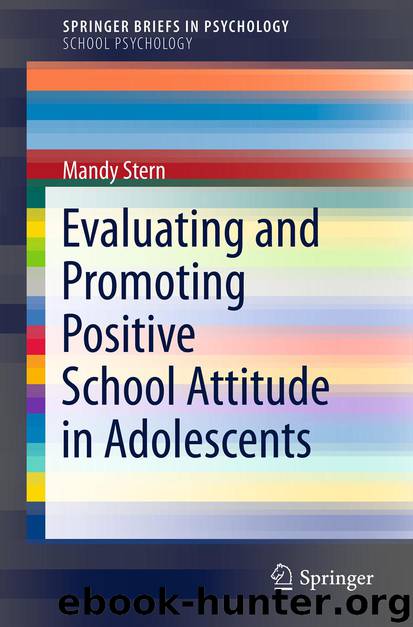Evaluating and Promoting Positive School Attitude in Adolescents by Mandy Stern

Author:Mandy Stern
Language: eng
Format: epub
Publisher: Springer US, Boston, MA
Since the adolescent desperately yearns for acceptance into a given peer group, there is a strong tendency for this individual to abide by the norms and behavioral expectations of the group (Brown, 1990). In fact, the importance of maximizing congruency among members is so important that if there are discrepant attitudes or behaviors either the incongruent member will separate from the group, or the group will keep the associate but modify their behaviors to reflect the formerly incongruent behavior (Kandel, 1978).
Lazerfeld and Merton (1954) introduced the term homophily to represent this tendency for a group of individuals to ultimately display very similar attributes, behaviors, and norms. Kandel (1978) broadened the application of homophily to characterize adolescent socialization and strivings for conformity among members. Two processes have been implicated in the development of homophily—selection and socialization described previously.
The selection process describes the fact that adolescents appear to select friends who display similar characteristics. In fact, there is evidence that supports that the degree of liking is related to the degree of similarity across dimensions such as attitudes, abilities, values, and personality traits (Kandel, 1978). The second process that works to establish homophily is socialization, that is, the act through modeling and reinforcement of increasing behavioral agreement among members, such that the group will become increasingly more similar over time (Kandel, 1978). Dunphy (1963) appears to convey the importance of homophily when he writes: “entrance to a peer group depends on conformity, and failure to continue to conform at any stage means exclusion from the group” (p. 239).
Of central importance to this study is the notion that peer attitude toward school is a significant contributor to an adolescent’s attitude toward school (Kinderman, 1993; McCoach, 2000a, 2000b). As has been discussed, the peer group exerts a tremendous amount of influence on shaping adolescents’ attitudes as the group strives for consensus and the individual considers group acceptance to be critical and thereby continually abides by its norms and behaviors.
In fact, previous research has established that crowds [large, mixed gender networks, comprised of multiple cliques (Brown & Klute, 2003)] commonly behave and define themselves with respect to the degree of importance they attach to schooling. Some adolescents categorize groups of peers in terms of how scholastically focused they are, such as “brains” and “nerds,” or degree of involvement in sports, such as “jocks” (Brown & Huang, 1995).
Another body of research posits that the importance of scholastic achievement of a given group is directly governed by strivings for popularity (Ellis & Wolfe, 2002). This research establishes the premise that behavior embraced by popular groups often involves deviant, aggressive behaviors which espouse antischolastic values (Rodkin, Farmer, Pearl, & Acker, 2000). Furthermore, youths’ perceptions also concur that more popular groups tend to engage in deviant, attention-getting activities (Ellis & Wolfe, 2002). Given these research findings, it is possible that students with the highest sociometric status (i.e., those who are popular) are members of groups which embrace anti-school norms and behaviors. However, other studies refute the findings, stating that
Download
This site does not store any files on its server. We only index and link to content provided by other sites. Please contact the content providers to delete copyright contents if any and email us, we'll remove relevant links or contents immediately.
The Art of Coaching Workbook by Elena Aguilar(51158)
Trainspotting by Irvine Welsh(21636)
Twilight of the Idols With the Antichrist and Ecce Homo by Friedrich Nietzsche(18619)
Fangirl by Rainbow Rowell(9228)
Periodization Training for Sports by Tudor Bompa(8251)
Change Your Questions, Change Your Life by Marilee Adams(7756)
This Is How You Lose Her by Junot Diaz(6874)
Asking the Right Questions: A Guide to Critical Thinking by M. Neil Browne & Stuart M. Keeley(5756)
Grit by Angela Duckworth(5601)
Red Sparrow by Jason Matthews(5464)
Paper Towns by Green John(5175)
Room 212 by Kate Stewart(5102)
Ken Follett - World without end by Ken Follett(4720)
Housekeeping by Marilynne Robinson(4434)
The Sports Rules Book by Human Kinetics(4378)
Double Down (Diary of a Wimpy Kid Book 11) by Jeff Kinney(4259)
Papillon (English) by Henri Charrière(4258)
The Motorcycle Diaries by Ernesto Che Guevara(4089)
Exercise Technique Manual for Resistance Training by National Strength & Conditioning Association(4059)
